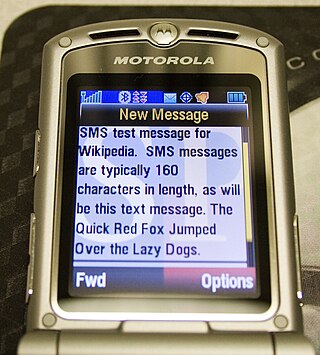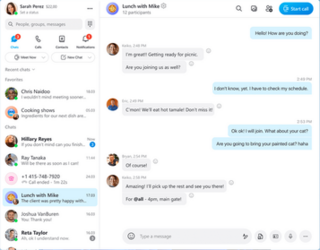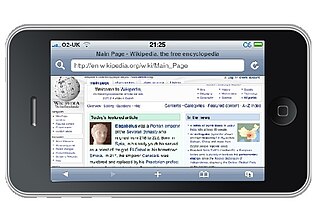
Short Message Service, commonly abbreviated as SMS, is a text messaging service component of most telephone, Internet and mobile device systems. It uses standardized communication protocols that let mobile devices exchange short text messages. An intermediary service can facilitate a text-to-voice conversion to be sent to landlines.

Iran's telecommunications industry is almost entirely state-owned, dominated by the Telecommunication Company of Iran (TCI). Fixed-line penetration in 2004 was relatively well-developed by regional standards, standing at 22 lines per 100 people, higher than Egypt with 14 and Saudi Arabia with 15, although behind the UAE with 27. Iran had more than 1 mobile phone per inhabitant by 2012.

A SIMcard is an integrated circuit (IC) intended to securely store an international mobile subscriber identity (IMSI) number and its related key, which are used to identify and authenticate subscribers on mobile telephone devices. Technically the actual physical card is known as a universal integrated circuit card (UICC); this smart card is usually made of PVC with embedded contacts and semiconductors, with the SIM as its primary component. In practice the term "SIM card" is still used to refer to the entire unit and not simply the IC.

Roaming is a wireless telecommunication term typically used with mobile devices, such as mobile phones. It refers to a mobile phone being used outside the range of its native network and connecting to another available cell network.
Globalstar, Inc. is an American satellite communications company that operates a low Earth orbit (LEO) satellite constellation for satellite phone, low-speed data communications and earth observations. The Globalstar second-generation constellation consists of 25 low Earth orbiting (LEO) satellites.

Near-field communication (NFC) is a set of communication protocols that enables communication between two electronic devices over a distance of 4 centimetres (1.6 in) or less. NFC offers a low-speed connection through a simple setup that can be used for the bootstrapping of capable wireless connections. Like other proximity card technologies, NFC is based on inductive coupling between two electromagnetic coils present on a NFC-enabled device such as a smartphone. NFC communicating in one or both directions uses a frequency of 13.56 MHz in the globally available unlicensed radio frequency ISM band, compliant with the ISO/IEC 18000-3 air interface standard at data rates ranging from 106 to 848 kbit/s.

Skype is a proprietary telecommunications application operated by Skype Technologies, a division of Microsoft, best known for VoIP-based videotelephony, videoconferencing and voice calls. It also has instant messaging, file transfer, debit-based calls to landline and mobile telephones, and other features. It is available on various desktop, mobile, and video game console platforms.

Worldwide Interoperability for Microwave Access (WiMAX) is a family of wireless broadband communication standards based on the IEEE 802.16 set of standards, which provide physical layer (PHY) and media access control (MAC) options.

A mobile browser is a web browser designed for use on a mobile device such as a mobile phone, PDA, smartphone, or tablet. Mobile browsers are optimized to display web content most effectively on small screens on portable devices. Some mobile browsers, especially older versions, are designed to be small and efficient to accommodate the low memory capacity and low bandwidth of certain wireless handheld devices. Traditional smaller feature phones use stripped-down mobile web browsers; however, most current smartphones have full-fledged browsers that can handle the latest web technologies, such as CSS 3, JavaScript, and Ajax.
The Personal Handy-phone System (PHS), also marketed as the Personal Communication Telephone (PCT) in Thailand, and the Personal Access System (PAS) and commercially branded as Xiaolingtong in Mainland China, was a mobile network system operating in the 1880–1930 MHz frequency band, used mainly in Japan, China, Taiwan, and some other Asian countries and regions.
Safaricom PLC is a listed Kenyan mobile network operator headquartered at Safaricom House in Nairobi, Kenya. It is the largest telecommunications provider in Kenya, and one of the most profitable companies in the East and Central Africa region. The company offers mobile telephony, mobile money transfer, consumer electronics, ecommerce, cloud computing, data, music streaming, and fibre optic services. It is most renowned as the home of M-PESA, a mobile banking SMS-based service.

This is a comparison of standards of wireless networking technologies for devices such as mobile phones. A new generation of cellular standards has appeared approximately every tenth year since 1G systems were introduced in 1979 and the early to mid-1980s.
Truphone is a GSMA-accredited global mobile network that operates its service internationally. The company is headquartered in London and has offices in ten other countries, being spread across four continents.
Chikka, short for Chikka Text Messenger, was an Internet-based instant messaging application that supported free SMS or text messaging between online users and offline mobile subscribers. Chikka was released by Chikka Philippines, Inc. in 2000 and eventually established its connection with the country's network operators Smart Communications (2001), Globe Telecom (2002) and Sun Cellular (2004). With up to billions of messages being exchanged between online and mobile communities worldwide through Chikka, it is probably the world's first commercially successful integration of web and mobile utilities.
Unified communications (UC) is a business and marketing concept describing the integration of enterprise communication services such as instant messaging (chat), presence information, voice, mobility features, audio, web & video conferencing, fixed-mobile convergence (FMC), desktop sharing, data sharing, call control and speech recognition with non-real-time communication services such as unified messaging. UC is not necessarily a single product, but a set of products that provides a consistent unified user interface and user experience across multiple devices and media types.

Hutchison 3G Enterprises S.A.R.L., trading as 3 (Three) and Hutchison 3G, is the owner of several originally UMTS-based mobile phone networks and broadband Internet providers, which operate in Hong Kong, Macau, Austria, Denmark, Indonesia, Ireland, Italy, Sweden, and the United Kingdom.

A mobile phone is a portable telephone that can make and receive calls over a radio frequency link while the user is moving within a telephone service area, as opposed to a fixed-location phone. The radio frequency link establishes a connection to the switching systems of a mobile phone operator, which provides access to the public switched telephone network (PSTN). Modern mobile telephone services use a cellular network architecture, and therefore mobile telephones are called cellphones in North America. In addition to telephony, digital mobile phones support a variety of other services, such as text messaging, multimedia messaging, email, Internet access, short-range wireless communications, satellite access, business applications, payments, multimedia playback and streaming, digital photography, and video games. Mobile phones offering only basic capabilities are known as feature phones ; mobile phones that offer greatly advanced computing capabilities are referred to as smartphones.

M-PESA is a mobile phone-based money transfer service, payments and micro-financing service, launched in 2007 by Vodafone and Safaricom, the largest mobile network operator in Kenya. It has since expanded to Tanzania, Mozambique, DRC, Lesotho, Ghana, Egypt, Afghanistan, South Africa and Ethiopia. The rollouts in India, Romania, and Albania were terminated amid low market uptake. M-PESA allows users to deposit, withdraw, transfer money, pay for goods and services, access credit and savings, all with a mobile device.
Professor Gerard Goggin is an Australian media and communications researcher at the University of Sydney. He has produced award-winning research in disability and media policy alongside other contemporary works on digital technology and cultures.

Link Motion Inc, formerly NetQin and NQ Mobile, is a multinational technology company that develops, licenses, supports and sells software and services that focus on the smart ride business. Link Motion sells carputers for car businesses, consumer ride sharing services, as well as legacy mobile security, productivity and other related applications. Link Motion maintains dual headquarters in Dallas, Texas, United States and Beijing, China. A Court Receiver, lawyer Robert Seiden, was appointed over Link Motion in February 2019 in the United States in the federal district court in the Southern District of New York by Judge Victor Marrero. The Receiver removed Wenyong “Vincent” Shi as chairman and chief executive officer, and replaced him by appointing Mr. Lilin “Francis” Guo.













